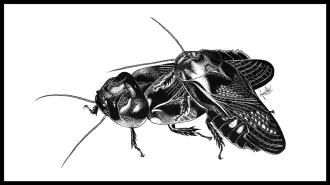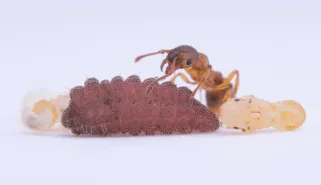Zebra finch youngsters learning to mimic adult songs lose ground but then recover whenever they sleep, according to an extensive study of recordings. After being awake several hours, the young males regain their mastery of the material and then improve on the previous day’s accomplishments.

During their slow start each day, the birds’ sounds vary a lot, according to Sébastien Derégnaucourt of the City University of New York. In the Feb. 17 Nature, he and his colleagues propose that during such a period of great variability, a learner reshapes his performance. Derégnaucourt compares the emerging song to modeling clay. “If it’s really hard, you cannot change it easily,” he says.
This research “is really the first study which describes an influence of sleep on memory formation and learning in a developmental context,” comments another sleep researcher, Jan Born of the University of Lübeck in Germany.
A male zebra finch learns to sing 30 to 90 days after hatching by mimicking an adult male’s song. The youngster makes noises that amount to avian baby talk, but as days pass, he “transforms his babbling into beautiful song,” says Derégnaucourt.
Before this project, researchers typically sampled just minutes of a bird’s daily baby talk. Derégnaucourt and his colleagues, however, spent 3 years developing software that could analyze all of each bird’s singing for weeks.
“This is the first time someone has recorded everything,” Derégnaucourt says. He ended up with some 40 million musical syllables of data for the 40 birds in the study.
The researchers found the morning deterioration in performance when they compared 100 versions of each syllable from the evening with 100 counterparts from the next morning throughout the birds’ development.
The downturn didn’t seem to come from that period of just-awakened fogginess familiar to many people. The dip in the birds’ song skills occurred even when the researchers delayed newly roused birds’ singing for a few hours by moving them to an unfamiliar environment and then returning them to their homes.
Nor does the downturn come from taking overnight hours off from practicing. When the researchers prevented the birds from singing for 8 hours during the day, they didn’t lose ground.
The researchers also injected melatonin to make the birds nap at atypical times. When they woke, the same dip in learning occurred.
That’s not natural sleep, however, comments sleep researcher Jerome Siegel of the University of California, Los Angeles.
Studies of other animals have suggested that sleep improves learning (SN: 11/6/04, p. 294: Wayfaring Sleepers: Brain area linked to slumber-aided recall). Although Derégnaucourt and his colleagues say that their new finding supports this view, Siegel says that “you could use it to argue that sleep degrades learning.” What he’d find more convincing, he says, are experiments showing that birds deprived of sleep fail to learn.
Born, who studies sleep’s role in learning, says that he’d like to know whether children, or adults, show deterioration in certain learned tasks after sleep.






